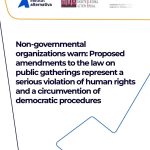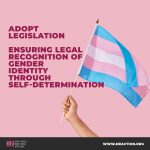14/8/2016 TO RAMADA HOTEL: DO THE RIGHT THING AND SUPPORT WHISTLEBLOWER PATRICIA POBRIĆ
15/08/201630/8/2016 ON THE OCCASION OF THE INTERNATIONAL DAY OF THE VICTIMS OF ENFORCED DISAPPEARANCES: MONTENEGRO SHOULD INVEST MORE EFFORT TO FIND REMAINS OF VICTIMS OF WAR CRIMES, DETERMINE RESPONSIBILITY FOR THESE CRIMES AND IMPLEMENT RECOMMENDATIONS OF THE UN COMMITTEE ON ENFORCED DISAPPEARANCES
31/08/201622/8/2016 HRA CALLS FOR THE NECESSARY CHANGES TO MEDIA LEGISLATION WITH THE INVOLVEMENT OF THE COUNCIL OF EUROPE, EU AND OSCE
Debate on the proposed amendments to media laws in the Parliament confirmed the need to introduce changes in particular to the Media Act, despite the lack of political will of the majority to adopt amendments to this Act proposed by opposition MPs.
Since 2010 Human Rights Action (HRA) has been advocating for amendments to the Media Act in order to ensure consistent application of the standards of the European Court of Human Rights in the legal system of Montenegro. We urge the authorities to start the procedure of amending the Media Act without further delay.
Taking into account the differences expressed among the political parties, we believe that Draft amendments to the Media Act, Electronic Media Act and RTCG[1] Act, which were submitted to the Parliament by opposition MPs, should be referred to the Council of Europe and the European Union for commentary. Observations pertaining to these laws of the OSCE Representative on Freedom of the Media Dunja Mijatović, that she had presented to the Prime Minister of Montenegro Milo Đukanović in a letter and recently announced to the Montenegrin public, should also be considered and discussed.
Please note that Mijatović did not criticize HRA proposals for amendments to the Media Act, submitted originally in 2010, and then, in a revised edition in 2015 to the Government (Ministers of Justice and Culture) and the Parliamentary Committee for Political System, Justice and Administration, which were also included by opposition MPs in their Draft amendments to the Media Act in July 2016. HRA proposals concerned prescribing of due journalistic care, grounds for the exclusion of liability for damage caused, limiting the amount of non-pecuniary damages, amending the provision relating to the right to correction and reply as well as provisions relating to privacy and interim measure for preventing publishing or republishing, etc. This further highlights the political nature of superficial and unsubstantiated attacks on these proposals that were heard during the debate in the Parliament and outside of it. HRA therefore believes that it is in the best interest of Montenegro to include experts on this topic from Europe in the process of amending the Media Act and other media laws as soon as possible, in relation to whom, we hope, the political parties in power will not have political prejudices.
Chronology:
HRA published its Proposed reform of liability for breach of honour and reputation in Montenegro (defamation and insult law reform) the first time in November 2010, with support from the Open Society Institute. In addition to proposing full decriminalization of Chapter XVII of the Criminal Code of Montenegro and introduction of new criminal offenses to protect journalists, the Proposed reform also contained amendments to the Media Act provisions relating to the standard of due journalistic care, exclusion of liability for damage, limiting the amount of compensation for non-pecuniary damage due to violation of honour and reputation, etc. The proposal was drafted by a working group composed of: Ana Vuković, Judge of the High Court in Podgorica, Dušan Stojković, attorney from Belgrade, Tamara Durutović, attorney from Podgorica, Veselin Radulović, attorney from Podgorica, Peter Noorlander, attorney, Director of Media Law Defence Initiative from London, consultant on the project, and Tea Gorjanc-Prelević, LL.M., Executive Director of Human Rights Action, project editor.
In 2011 Montenegro decriminalized offenses Defamation and Insult, but did not start working on amendments to the Media Act, which was adopted in 2002 and is currently the oldest and shortest media law in the region.
In 2015 HRA amended the original proposal of amendments to the Media Act and on 2 July 2015 held a discussion in Podgorica on the new proposal with the participation of Minister of Culture Pavle Goranović and Minister of Justice Zoran Pažin. The proposal was drafted by HRA working group composed of: Azra Jasavić, MP of Positive Montenegro, Draginja Vuksanović, MP of Social Democratic Party of Montenegro, Dragoljub Duško Vuković, journalist and media analyst, Goran Đurović, Chairman of the Commission of RTCG Council for petitions and complaints of listeners and viewers and Chairman of the Board of NGO Coalition Through Cooperation to Goals, Jadranka Vojvodić, Deputy Director of Electronic Media Agency and Tea Gorjanc-Prelević, HRA Executive Director. Peter Noorlander, media law expert, Director of NGO Media Law Defence Initiative, London, assisted as a consultant. Conclusion of the debate was to initiate organisation of a consultative or control hearing in the Parliament with Ministers of Culture and Justice, with a view to making formal analysis of the shortcomings of the legal framework for media operation.
HRA addressed an initiative to the Committee on holding a consultative debate on the need for amending the Media Act on 10 November 2015. In addition to Proposal of amendments drafted by HRA working group, which should contribute to the harmonization of the Media Act with ECtHR caselaw, the working group also proposed establishing of a comprehensive Fund for media pluralism, prescribing procedures and criteria for transparent advertising of state in the media, as well as specifying the rights of journalists in relation to the media founders. HRA has reminded the Committee that in the Guidelines for support to media freedom and media integrity in the Western Balkans and in Turkey 2014-2020, the European Commission stressed that parliaments should “conduct periodic assessments of the state of media freedom, measuring national laws and practice against a range of basic principles on the “quality of law” stated in ECtHR case-law and the indicators listed in the Council of Europe PA Resolution 1636 (2008)”, and “put forward and adopt policy and legislative proposals in line with the EU law and above principles and indicators to address the shortcomings”.
In its meeting held on 7 December 2015, upon the initiative of HRA the Committee took a unanimous stance that “in the coming period, it is necessary to organize a consultative hearing (debate). In this regard, the Committee will invite all the proponents and competent experts to contribute to the improvement and advancement of issues in this area.”
At the beginning of July 2016, three MPs from opposition parties URA, Demos and SDP submitted to the Parliament their Draft amendments to the Media Act, which contained HRA proposals as well. The three MPs also proposed Draft amendments to the Electronic Media Act and Draft amendments to RTCG Act.
The Committee had scheduled a discussion on Draft amendments to the Media Act for 26 July 2016, however, the discussion was cancelled on that day due to lack of quorum, i.e. boycott of the ruling Democratic Party of Socialists (DPS).
The Parliament did not adopt Draft amendments to the Media Act at the end of its session in July 2016.
In a press release of 12 August 2016, the OSCE Representative on Freedom of the Media Dunja Mijatović stated that in her letter to the Prime Minister Milo Đukanović of 27 July 2016 she had expressed concern about proposed amendments to the three media laws in Montenegro (Media Act, Electronic Media Act and RTCG Act) and drew attention to specific provisions which, in her opinion, could have an adverse effect on media pluralism in Montenegro. In relation to the Media Act, she expressed her concern only in terms of wording of the provisions on state advertising in the media, which was not included in HRA proposal.
[1] Radio&Television of Montenegro.







 English
English